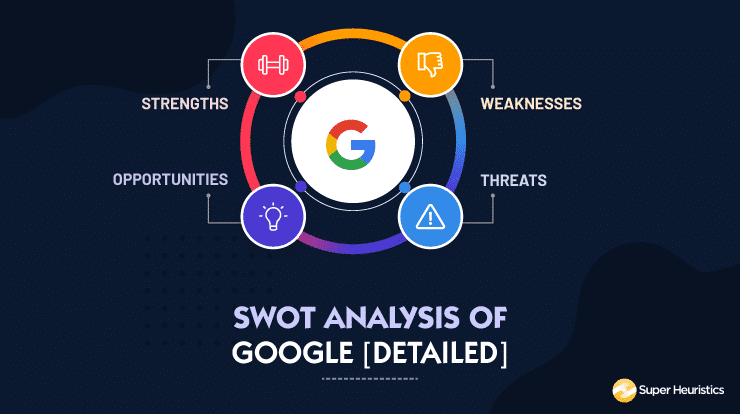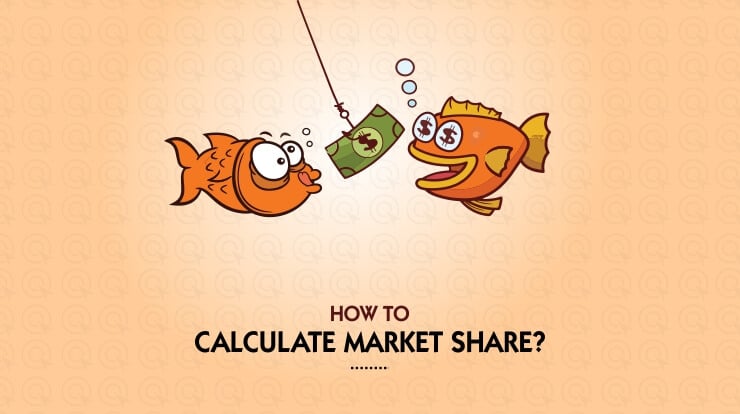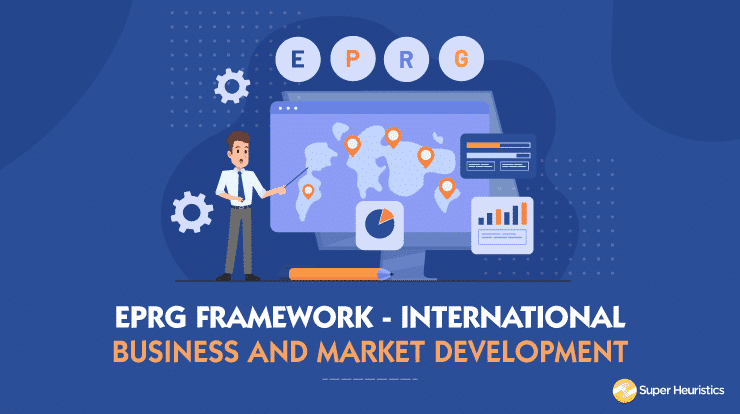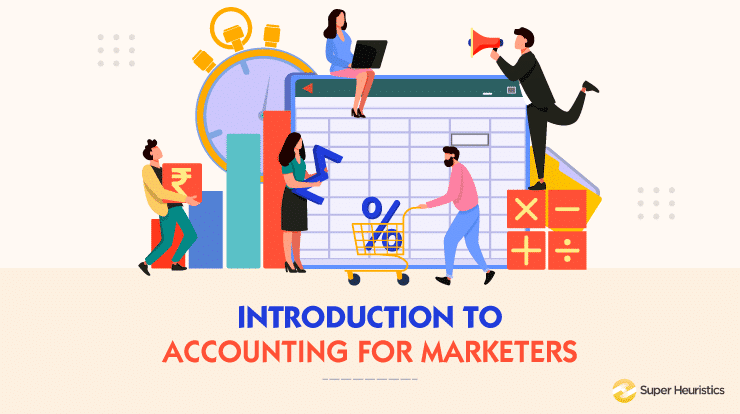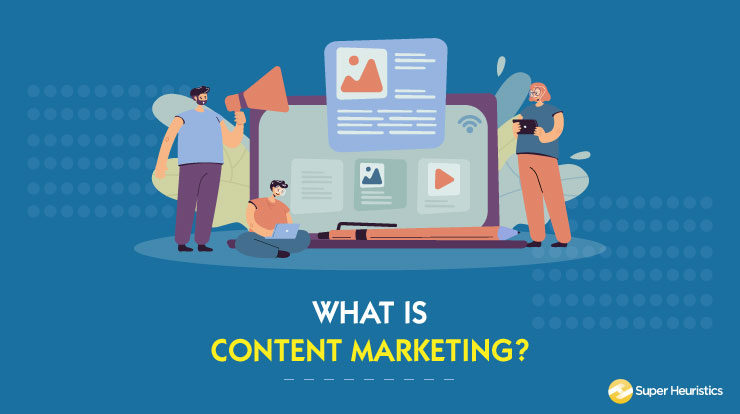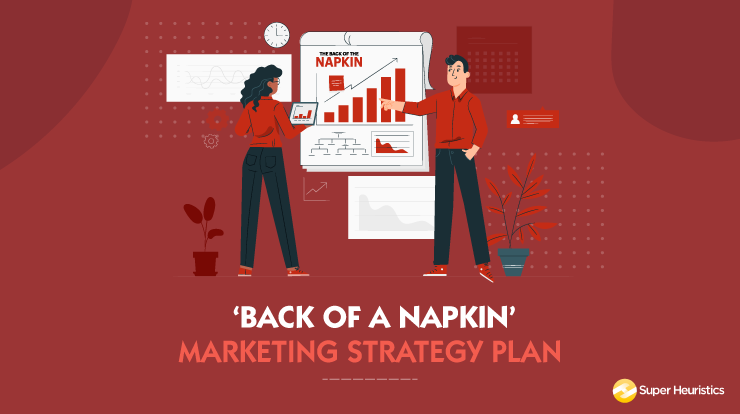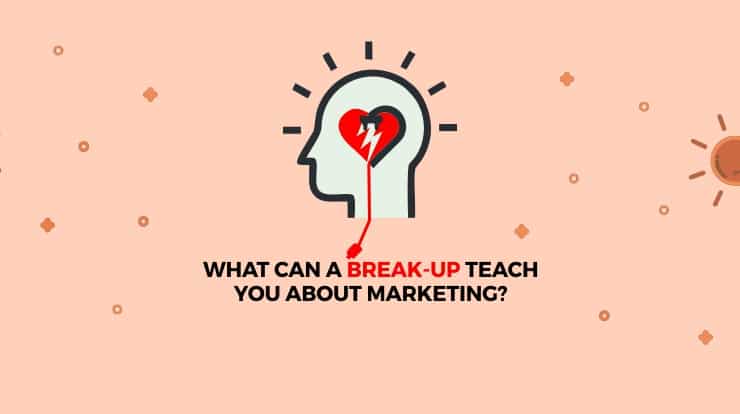
It's really a weird kind of post for me to write and, probably, even for you to read. Breakup and marketing don’t relate directly with each other in a way that you can draw parallels between the two - like I will be doing in this article.
A breakup in itself is an extremely soul-crushing, mind-wrecking, heart-wrenching apathy in which I think people do momentarily lose on a lot of objectivity. However, at the same time, the best ways to deal with a breakup are only two:
- Be truthful and don’t lie to yourself about how you feel
- Immerse yourself in your work, hopefully something that you love doing
Now, I have been through a breakup recently and now that I have come a decent distance in moving on from it, I have found some objectivity to think and analyse it.
This article stems out from there. And this piece really helps me in doing both the things that I mentioned above.
That is, one, it helps me in putting out all the things that I feel into perspective and in viewing them dispassionately (for a change). And, two, it does let me immerse myself deep into the work that I love the most - marketing and blogging.
How can a breakup even teach you anything about Marketing?
A breakup does alter your life in more ways than you would think it does. In the worst cases, it affects your appetite, mental and physical health. And in the best cases, you start seeing it as a character-building exercise.
Usually, it does affect your work life for a few days, because work is got to be the second big thing on your mind, if not the first.
Driving back home from office, when work finally starts taking one corner of the mind, you do try to pull up the thoughts of work back again and think more about it to make yourself comfortable. And that’s when the thoughts of a breakup and work sort of spill over.
And since the breakup has suddenly woken you up from years of slumber and now you’re all motivated to do well at your workplace. You tend to ask yourself what can this life event teach me that can make me better at my work?
And that is where you start drawing parallels between a life event like a breakup and work. Something that you wouldn’t have done otherwise.
My work is Marketing, Sales, Product Management and Blogging. Putting that in the blanket term of ‘Marketing Strategy’, that’s all I do each day. And, therefore, the parallels that I drew gave me a better perspective about marketing strategy, in general.
And trust me, it does bring out insights that can take you years ahead in terms of work experience.
So here are the 5 things that a breakup taught me about Marketing.
1. Know what you are getting into
This is not a caveat emptor. I am not talking about being careful and investigative about the other person and then making the choice of whether you should get into the relationship or not.
No, that’s not even my point.
In fact, even in hindsight, I would still choose to get into this relationship that I was in 100 out of 100 times despite the mild clashes which followed and the breakup.
What I am telling you here is pretty simple. It is about knowing the person you are getting together with, observing them, being aware of their best points and short-comings and making a mental note of it.
How does it help?
You will not be in for heart-jitters when the person does something which comes from their natural self, something you should have been aware off.
The problem happens when you don’t establish these things in your head and things start playing out the way they were supposed to play out, but you were just not mentally ready.
This is also applicable post breakup. You can’t judge somebody without appreciating their context. Because when you know the context in which they had to do something, you will stop judging them and will truly understand them much better.
Marketing Tip #1
Know your customer in and out even before you commit to service them. There is a reason why marketers swear by this really brilliant tool called Customer Personas.
When you know about the customers, not just their physical details (name, age, location etc.) but their psycho-graphic and behavioral details as well (likes, dislikes, current life stage, goals, challenges, thought, perspective etc.), it is then that you are fully aware about them.
And therefore, only once you have a complete idea of what the customers want, how do they behave in a situation, you will have a grip on what to do and what not to do.
For an example, here is the user personas which I created for my blog Super Heuristics just a few days after I started the blog.
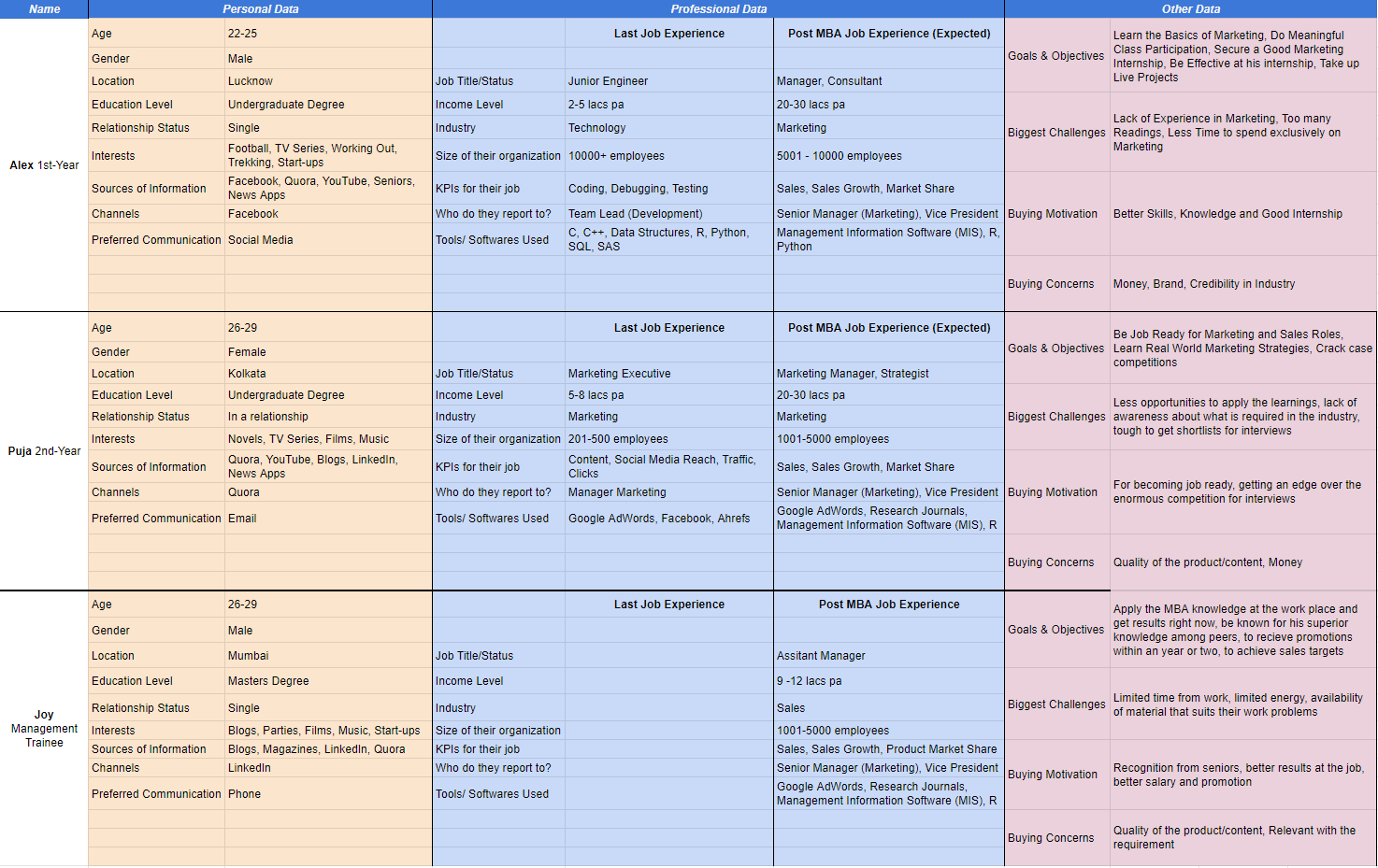
I went into a fair amount of detail and gave a decent amount of thought in imagining the different kind of people that are likely to read my content.
This helps me or any marketer to have a deep connection with the readers and, therefore, personalize your content and offerings as per what they seek.
In a B2C context, let me give you an example of a course that I sell at my workplace. The target segment for that course is such that over the years we have observed that the market is agnostic of the price and you tend to sell the course much easier when it is not discounted.
Whatever floats their boat! As long as you know that already, you won’t sink.
However, what I explained makes for a better analogy in the B2B context. It's more relatable to a girlfriend-boyfriend scenario.
You are much more closer to the customer in the B2B setup.
And that allows you to see all the quirks, whims and fancies of the customers right up front (sounds like a relationship?).
Therefore, you need to look within the customers and know them as the people they are. That will let you manage that relationship in a much smoother way.
2. Say what you truly feel and what you truly are
There is no better way of impairing a relationship than by putting a filter of your ego and ignorance to every thing that you truly feel and then not saying those things at all.
Ego is an epidemic. It has killed more things (like relationships, trust, friendships, faith beliefs, happiness and even people) than any other thing.
If you want love, you go out there and give love to the other person. It's a shame to not spread love because you have ego attached to what things you will express and what things you won't.
Ego starts from some really weird presumptions you have in your head but its ends up in making the equation a power-struggle - who can display more ego between the two and who bows down in front of the other person.
Ditch ego.
If you love the person, go and tell them that you do. If you don’t like something about them, go and tell them that right now - not 3 weeks later when you might bring it up in a completely unrelated fight.
Marketing Tip #2
Communicate your value in your marketing communication! No presumption that they would know this thing about my product or that thing about my product already.
If there is something that you feel that needs to be communicated, then communicate that in your marcom.
Now having said that, this calls for two immediate activities that you should carry out as a marketer.
One, is to put together a list of things that you want to communicate to the market, or to your existing customer that you have always thought that they would know. Check the veracity of this belief of yours right now.
Would they truly know this?
Would it have registered in their minds when we once vaguely mentioned it in some part of our ad copy?
Should we say these things to them more often so as to reinforce them?
Two, is to go into a deep thought and understand for yourself that, as a marketer, are you aware about all the benefits of your product or is something hidden in the shadow of your ignorance.
For me personally, this has happened in marketing many-a-times.
Say for example, there are key value points regarding a product or a call-to-action that I know are important but I used to let go of them on the landing pages.
And that’s because I was living in the impression that these are hygiene factors in the industry and that the market would already know about them.
Wrong thing to do.
Because most of the times absence of communication will be assumed to be absence of value.
A really detailed and informative article by Neil Patel on Marketing Land happens to mention this as their point number 1.
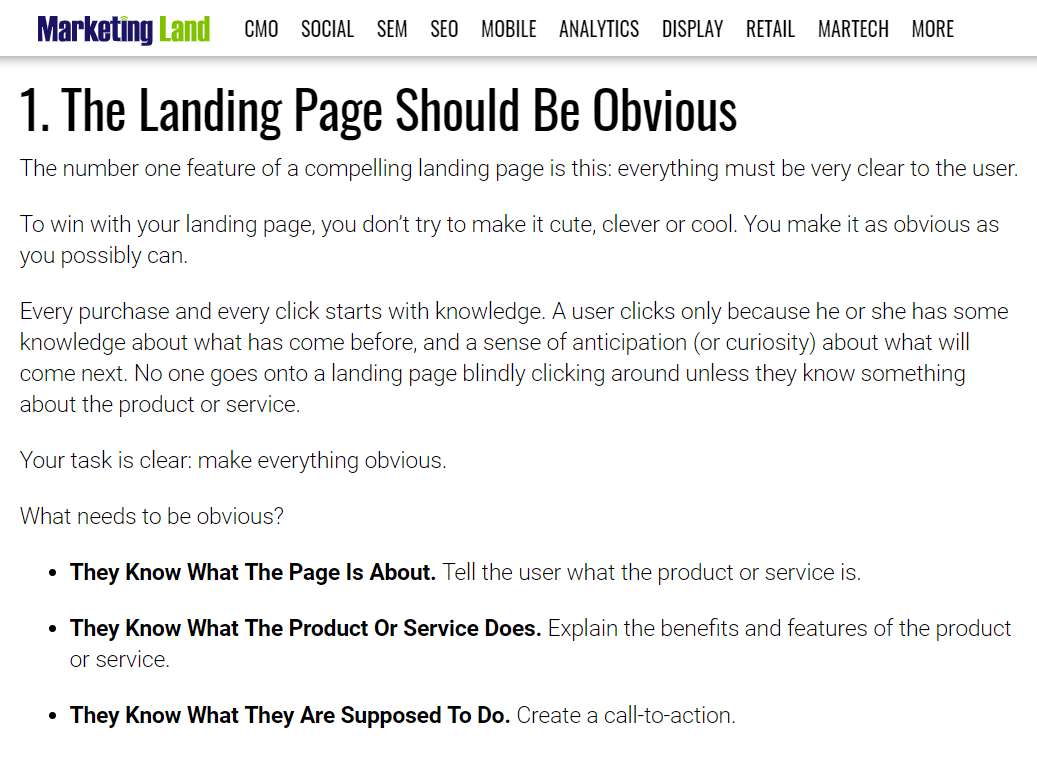
Neil clearly mentions that the ‘Landing Page should be obvious’ and that as a marketer your task is simple, to make everything obvious.
The idea is to speak up and be open about your feelings at every point of time.
3. Don’t say what you don’t mean
Sales and marketing people do have a thing for promising the customers the stars and the moon.
Over-promising and under delivering is common. But that’s not what the problem is always.
What about the times when you throw around tantrums, say mean things, when you actually don’t mean anything that you have said.
That is such a tricky situation. Because you would never know whether the other person really meant what they said or was it just something you are supposed to say.
In a relationship, you should be mindful of the fact that the things you say does leave the other person with some feeling. Therefore, what I have learned from the breakup is that one should be extremely mindful of the words that one utters.
Because the other person would usually take it on the face value. And even if you don’t mean what you saying but if you say it enough times, it will become it true in the other person’s head.
It totally does.
Marketing Tip #3
This is again a straight and simple advice right from any good sales book. Do not promise your market the things that you don’t really mean or intend to deliver.
Often times, amidst intense competition, marketers and salesmen get ahead of themselves and tell things which aren’t completely true.
What follows after this are failed attempts to cover up. Because when your skin is in the game, you tend to put in extra efforts to cover up for the things that you promised and are now failing to deliver.
This does lead to a breakup and is one of the greatest reasons why start-ups fail badly.
Here is an example from my work life wherein over-promising almost cost us a refund. We were creating an opening email sequence for our customers who just get on-board with us.
In this first on-boarding email sequence, we wanted to give the customer a personal touch from the sales agent who got him on board. And therefore, we planned a new ‘Heart-2-heart’ mailer that would be the first email that customer receives.
Here is one of the lines from that mailer.

Now if this promise of ‘leaving no stone unturned’, as written in this email, is followed by a not so warm service support, you will tend to break a few hearts.
4. Follow a person as they change
Here is something really interesting that I read on a social media site a few days back. This was about how in order to make a relationship last, you really have to flow with a person as they change.
That post talked about how a grandfather once mentioned that during the 60 years of his relationship, his wife had changed so much that it was almost as if he had lived with 8 different people throughout this time.
The secret to the relationship, he said, was to not suffocate the other person with your own expectations of what the person should be. In fact, it is to embrace fully every new personality that the other-half became.
Marketing Tip #4
One of my first few articles that I wrote when I started this blog was on Market Segmentation Mistakes. I mentioned there in that article that how being rigid with your segmentation and not conducting the segmentation exercise often will lead to a customer understanding that is not relevant in the present sense.
But while we are talking about following a customer across the customer lifecycle, Hubspot has an interesting take on this.
I recently attended a marketing conference by Hubspot where they spoke about how you as a marketer you should look at the customer journey as a flywheel and not as a funnel.
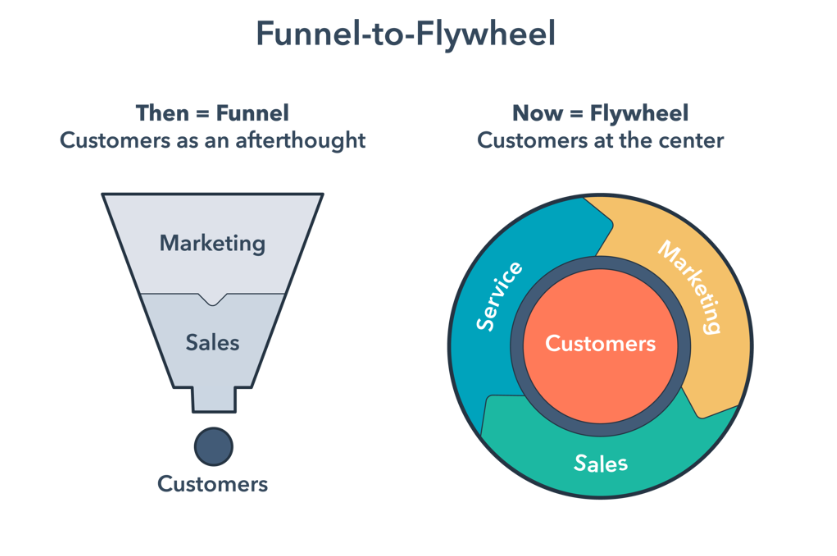
The flywheel should continue to spin with the force being applied by the three forces of Attract, Engage and Delight. Only when this flywheel keeps spinning, your customer’s life cycle is alive.
Isn’t “Attract, Engage and Delight” similar to what you would do in a relationship?
What Hubspot says about the classic funnel is that in a funnel, “the customer is the outcome — nothing more, nothing less. All of the energy you spent acquiring that customer is wasted, leaving you at square”
Whereas, when you look at the customer journey as a flywheel you win as a marketer because their customers are helping them grow as well.
Therefore, the secret to improving your profitability across the customer lifetime is to, firstly, increase the customer lifetime and secondly, follow the customer across his life stages and bring out offerings that are relevant at each stage.
From a digital marketing stand-point, it is important to trace the user journey across the different pages of your digital property.
Each important page that is visited by the visitor will give you a signal of in what stage is the person currently in. And therefore, all your marketing communication and campaigning, needs to be focused on that stage of the customer.
5. Don’t delay the sales
If you are not decisive about the relationship you are in, that is a problem. Whether you want to be in that relationship or not, that decision has to be made today. Don’t delay getting to that decision.
It works both ways, that is, if you feel that the person you are with is the person that you wish to be it or if the person doesn’t seem like the person you wish to be with. That decision has to be made today.
The more time you take in taking a stand for your relationship, lesser becoming the chances of the relationship coming through.
Most would throw a counter logic at this one. That the more time one takes in coming to the decision, the better would be the decision.
On this front, the following marketing tip should give you more insight into why that doesn’t work.
Marketing Tip #5
It is as simple as it sounds. Don’t delay sales for a prospect that has come into the system. The time it takes for a prospect to convert into the customer should be optimal.
The very fact that a prospect dropped their email and details on your property is because they are interested in your offering and they wanted to learn more. Do you think there could be a more opportune time to pitch to them for the first time?
Sure, most would say that this philosophy flies right into the face of nurturing a prospect to take them further down into your sales funnel. That is in incorrect.
Nurturing is an ongoing process.
Talking about an email sequence of, say, 10 emails, if you are not pitching your product within the first 3 emails you are already to late.
Here’s some data. Nutshell’s Forster Perelsztejn says that, 70% of responses are generated by the 2nd to 4th email of the sequence. That means you need to pitch for a sale that early. If you delay it further down the sequence, it's already too late.

I mentioned it in one of the articles I wrote earlier on ‘Branding and Love Marriages have a lot more in common than you think’’. I wrote that ‘selling’ happens much before than the actual transaction of money happens. It happens when someone falls in love with your brand.
Conclusion
Here was a list of the 5 things at the top of my mind which I learned from a breakup. Most of these, as I mentioned, are the most obvious and basic things. However, some of these things are so obvious that marketers tend to ignore it.
I, myself, have had the experience to ignore the same at my workplace and also in my relationship. Therefore, if you are a marketer and want to stay away from breaking up with your customers, do make sure that you get these basics absolutely right.

